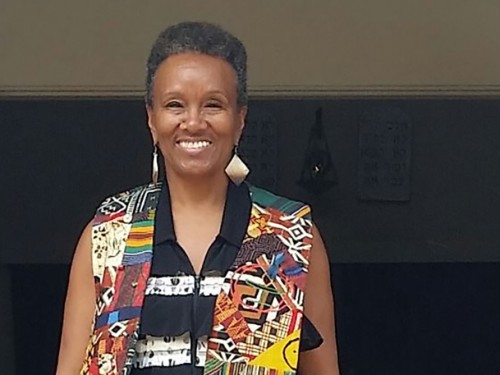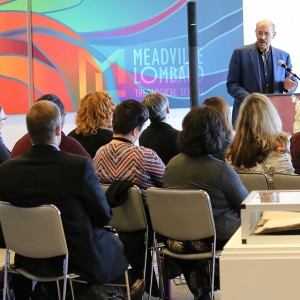Collecting Stories from Black Unitarian Universalist Women
An interview with Rev. Qiyamah Rahman, MDiv '08
MLTS: You are working on two things right now, is that correct?
Yes, two different projects: an anthology and the Minns Lecture. For the anthology, I'm looking to gather voices of Black Unitarian Universalist clergy who identify as women, to hear their stories. This has not been done before. The seed was planted when I read Mark Morrison-Reed's Black Pioneers in a White Denomination back in 1998. It's an amazing book. And I wondered, so where are the Black clergy women’s voices? And I waited, thinking somebody is going to write it, somebody's going to tell that story, and it didn't happen. And so I began to think, well, maybe I'm going to have to do this.
That's how that project came into existence. Now the other projects is that I've been invited to present Minns Lectures at three different times.
The topic is the presence of Black women in Unitarian Universalism. Up to this point, we talked a lot or there's been a lot of writing and research on some of the more celebrated Black UU women: Frances Ellen Watkins Harper, Fannie Barrier Williams. I could go on and on in terms of some of the women who are very well known. The UU Women's Federation did annual calendars with the women's pictures and bios and eventually published a book. But beyond the celebrated and more noted historic figures, we've not gathered the voices of everyday, ordinary, Black Unitarian Universalist women. And so I've done a survey to gather some of the information, hear what attracts Black women to Unitarian Universalism, what has kept them in the fold in the community of Unitarian Universalism, and what have been some of the challenges. That's what the Minns Lecture series will focus on. I'm just so excited that this information can be gathered and placed in the Sankofa archives at Meadville Lombard so that researchers like myself, or just students who just want to come and learn about some of the history, will be able to access this information.
I've met women who were in their eighties and I'm pleased that I've been able to capture some of those stories, but what I'm also seeing is some have died in the process. And so it makes it even more compelling and urgent to do this research. Yes, we have young women, but we have women who have been around for many years—we don't want to lose those stories. That's a legacy that we can't recapture or regain once they're gone.
These past three years have been very volatile and feel like a labor-pain period for Unitarian Universalism as we try to be reborn and become fully inclusive, fully diverse, and fully welcoming. How do you feel about it as a person who does research into stories of marginalized groups within UUism? And what is your hope? What is your future prediction, so to speak, for the People of Color who are in Unitarian Universalism or who are attracted to UUism?
I think it's a complex, complex situation. On the one hand, I am so proud to be a Unitarian Universalist. When I tell my story, what I say is that I was initially attracted to the social justice orientation of Unitarian Universalism. The justice, the love for justice, the compassion for justice, the recognition that all individuals deserve to live quality of life and deserve to be treated fairly and justly. What has kept me a Unitarian Universalist is the theological diversity; who I was theologically back in 1992 is different from who I am today, and in most other faith traditions, most other faith communities, I would not have been granted the grace to be able to explore. Not only the encouragement, but it's expected in Unitarian Universalism. No one is going to hand me my theology and say, this is what we believe. We have our principles, but we are encouraged to really, really explore and to study and to reflect on who we are, and who we are in the larger world. That's the exciting part. I think the part that is heartbreaking is for those of us who have been driven for social justice, who have worked for justice for so many years, to find out in the last few years that the kind of community and the kind of world we were visioning didn't exist. And that diversity that we were fighting for, that we were striving for, didn't exist in the staffing patterns in our leaders on the leadership level. That was, for me, absolutely heartbreaking. It sent me back for a minute; I wasn't checking in that much. You get to be doing the work and you're so sure that what you're doing is making a difference. I wasn't even checking in. And so to discover that the results of our work were not reflected in the staffing patterns, it took me a minute. But after that minute, it's like, oh no, we're gonna do better. We are going to do better.
So what does "better" look like? It's different for everybody. My research project is my legacy to Unitarian Universalism. The struggle I am engaging in, the paucity of research and scholarship—it's not there. It's not there because we haven't done the work. I don't want future generations to have to experience this. I want them to be able to go into the archives. I want them to be able to go to Boston and Chicago and various places where we store and share and feature the information. I want it to be there. I want the voices and the stories to be there, to inspire, to encourage, to remind us of what others have experienced in past years. That's my legacy. We aren't sure what our legacy will be.
We all choose our lane and our battles and our focus. Once I got over, "Oh, wow, we're not where I thought we were," then I began to really be inspired that what I'm doing is important. This needs to exist. There are others who will want to be in high visibility leadership positions. At one point in time in my life, that would have been me. But what I'm doing now, my legacy is this research. What I'm finding in the archives is there, because others took the time, others saw the need for it. And I'm carrying the torch and continuing that legacy by building on that, so that there are richer and more extensive archives and information that will be available for others, and that this information will say, we were here, we are here, and we made a difference, “This is how we made a difference.”
I was talking with someone the other day who is on the board of the UU Women's Federation with me, and we were talking about the fact that we needed to write our stories down. For instance, my first General Assembly was the Charlotte GA. And if you know anything about that, that was the year of the Jefferson Ball. I want people to know that the Unitarian Universalist Women's Federation at our board meeting, we met and we said, no, this should not happen. And we wrote a letter to the GA planning committee. Well, as you know from history, they ignored not only ours but others, but I was saying to the person I was speaking with the other day that if we don't write this down, if we don't capture this information, who knows that the board members of the Women's Federation sat down, discussed this, reflected on it, and recognized the contradictions and said, no, this cannot happen and it can't happen for these reasons, and that we sent a letter—that's history that will be lost if we don't capture that. And we were talking about other things that have transpired in history that no one will ever know about because we didn't write it down for future generations to be able to go back and say, oh, this is what the Women's Federation was doing. Whatever organization, whatever the individuals might be, when it's not captured, it's as if it didn't happen. Even the old history, if someone isn't speaking it or writing it, capturing it in some way, it's as if it didn't happen. [Laugh] You can tell I'm excited about it!
Sankofa Sermon Project: Call for Sermons from UU Women of Color
In conjunction with Rev. Rahman's forthcoming anthology, The Presence of Black Clergywomen in Unitarian Universalism, Sankofa Special Collection at Meadville Lombard is collecting sermons written and delivered by clergy or laypeople who identify as Unitarian Universalist and women, womanx, trans and/or female from marginalized communities of color. Submission deadline is December 31, 2020.

Rev. Qiyamah Rahman
Rev. Qiyamah Rahman, MDiv ’08, served as the Director of Contextual Ministry and Senior Lecturer at MLTS from 2008 to 2012. She has been helping communities on St Croix, Virgin Islands, as a medical social worker, clergy at the UU Fellowship of St. Croix, community minister helping individuals who are experiencing domestic violence and sexual assault. She has also been working as a disaster case manager with the long-term recovery group, helping individuals who have lost homes during Hurricane Maria relocate into permanent housing.

